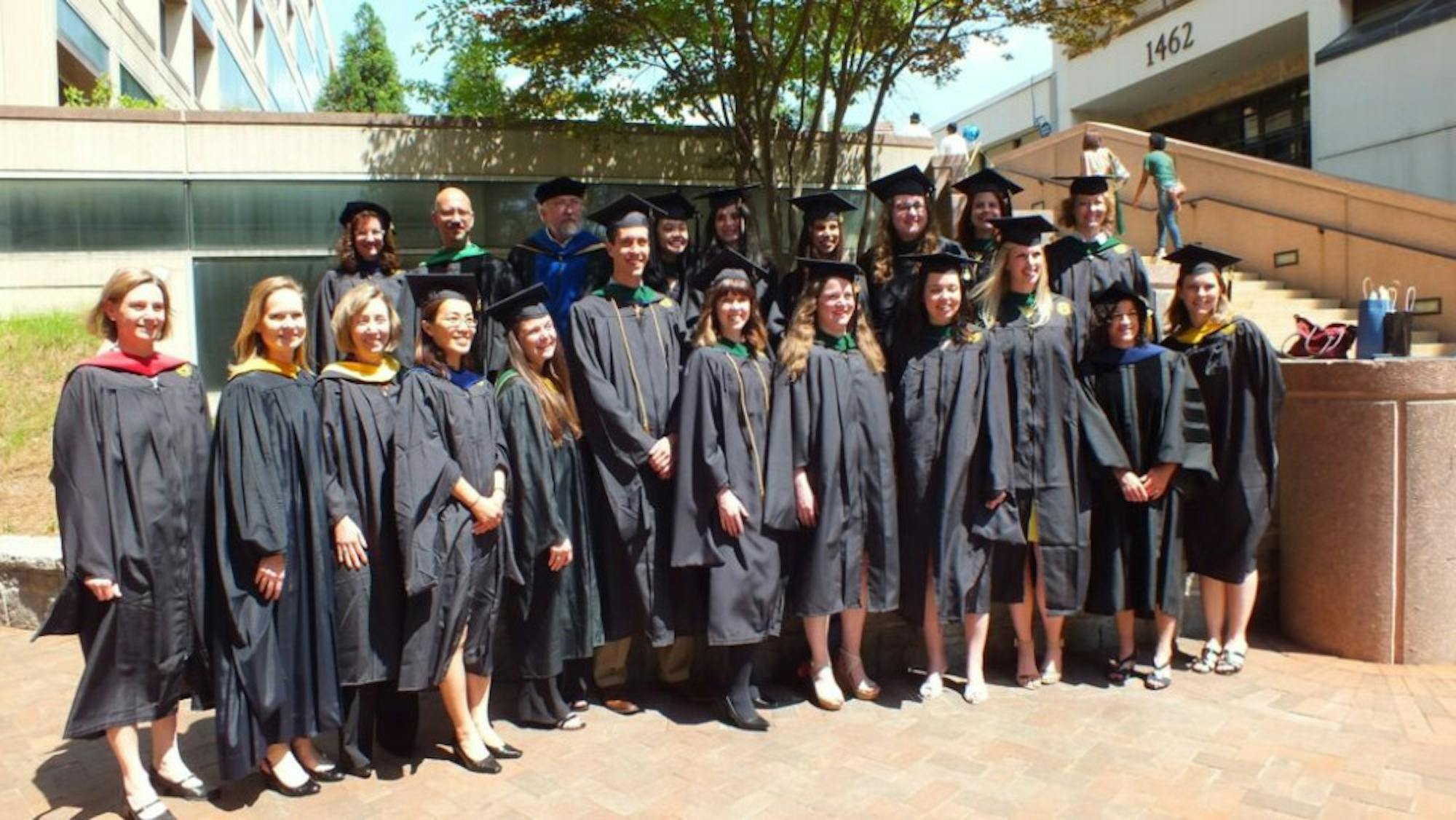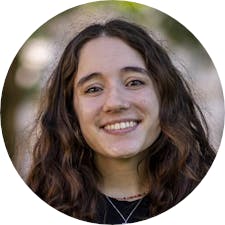Cecelia Bellcross, who founded Emory University’s Genetic Counseling Training Program and was considered a leader in the field of cancer genetics, died unexpectedly on June 8 at 63 years old. She is survived by her husband of 36 years, Wayne, and her children, Connor and Aleia.
Cecelia was born on April 5, 1960 in West Seattle. She was an avid gardener, hiker, biker and knitter. She loved to read and spend time in her family’s cabin in Murphy, N.C.
But teaching was one of Cecelia’s greatest passions. She was the first genetic counselor to earn the role of full professor at Emory.
“Everything she did came from a place of wanting the best for her students,” Wayne wrote in an email to the Wheel. “She set incredibly high standards for her students because she knew they could meet them, and then set out to build the experiences and supports to help them succeed.”
Path to Emory
Cecelia’s journey to Emory’s genetics department began in a Washington high school biology classroom, where she taught after receiving a bachelor’s degree in biology from the University of Colorado Denver. After teaching for three years, Cecelia attended a conference for women in science and discovered her passion for genetic counseling — a relatively new field in which she would become a leading name.
Earning her master’s degree in medical genetics at the University of Wisconsin-Madison (UW-Madison) in 1990, Cecelia practiced as a clinical genetic counselor in Madison, Wis. for 20 years. Genetic counselors collect patients’ individual and family health histories to determine their likelihood of having or developing a genetic condition, as well as their odds of passing down genetic conditions to future generations. As a genetic counselor, Cecelia helped a local hospital and health maintenance organization develop a cancer genetic counseling division.
The Ohio State University Genetic Counseling Graduate Program Director Dawn Allain met Cecelia after relocating to Wisconsin. They worked at different institutions but crossed paths during a state-wide meeting, where Allain said Cecelia was the first person to welcome her as a practicing genetic counselor in Wisconsin.

Cecelia and Allain formed a close relationship in the early 2000s. Alongside Cecelia and three other colleagues, Allain helped found the Wisconsin Cancer Risk Programs Network, where they met regularly with other cancer genetic counselors in Wisconsin to discuss different cases and problem solve as they worked to develop cancer genetics programs at their respective institutions.
“She was a force to be reckoned with,” Allain said. “I don’t even know how to begin to describe how much just talking to her helped me learn.”
Cecelia earned her Ph.D. in population health sciences from UW-Madison in 2007. As a Ph.D. candidate, Cecelia developed and validated the Breast Cancer Genetics Referral Screening Tool, which was later endorsed by the United States Preventive Services Task Force and is still used today.
Following her career in genetic counseling, Cecelia moved to Atlanta and completed a American Society of Human Genetics public health genetics postdoctoral fellowship at the Centers for Disease Control and Prevention (CDC).
Lasting legacy at Emory
While she was working at the CDC, an Emory representative asked Cecelia to help the University develop a graduate degree program for genetic counselors. Cecelia then joined the Emory community in 2010, where she founded and directed the Emory Genetic Counseling Training Program, which was established in 2011 as the first of its kind in Georgia.
Lauren Lichten, who co-directed the Genetic Counseling Training Program with Cecelia and is now serving as the sole director, described Cecelia as “one of the earliest trailblazers” in cancer genetics. Cecelia was not afraid to take unexplored paths, and she brought this attitude to Emory to form a unique program, Lichten added.
“That’s a testament to her not being afraid to try something that hasn’t been done before, which is how she was able to achieve so much in the space of cancer genetics,” Lichten said.
Kate Garber, who is an associate professor and director of education for the department of human genetics, said that Cecelia was a “real dynamo” in her pursuit to start the program. While the program aims to prepare the next generation of genetic counselors, Cecelia wanted to do more than just train her students — she wanted them to be “exemplary.” Garber said Cecelia would work with anybody and everybody to make that happen.
“It’s a program that really continually evolved with the idea of making it the best program for the students,” Garber said. “We were always moving forward, and that was really thanks to her leadership and her guidance.”
Kelly Teed (14A) is a member of the program’s first graduating class. She met Cecelia during her admissions interview, and said she could immediately tell the program was “special.”
“She was creative and high-energy and just made me very excited and made it my top choice, just from that first encounter,” Teed said.

Lucas Lopez (23A) also recalled first meeting Cecelia when he was a nervous college senior interviewing for the program. Lopez said he was intimidated and asked Cecelia if he was in over his head, but she reassured him he was great for the program.
“She really brought me back down to Earth and really encouraged me,” Lopez said. “It’s a big reason why I went to Emory in itself was because of a community that I knew that [I] would receive through the professors and through the leadership, and that was certainly what I got and what I’m really, really thankful for going into my career.”
Cecelia made not knowing something a strength in her classroom, Elizabeth Jordan (14A) said. She taught Jordan to view the unknown as “another open door to travel,” and Jordan continues to look for the unknown in her own work as a genetic counselor.
“She really made living in this very much growing, uncertain world of genetics a much more exciting place to be when we don't have all these answers quite yet,” Jordan said.
Teed added that Cecelia was dedicated to helping her students build connections with key people in genetic counseling, often bringing in field leaders for guest lectures. She ensured her students received “life-changing or impactful” real world experiences, such as Teed’s work with a family whose child had Down syndrome.
Emory Genetic Counseling Training Program Director of Student Research Ami Rosen added that Cecelia worked to expand opportunities for everyone around her, not just her students. Cecelia first got Rosen involved in the program as a guest speaker, but later offered her a leadership position. Without Cecelia, Rosen said she does not believe Emory would have as many subspecialties of genetic counselors.
“Dr. Bellcross was instrumental in pushing for me to become faculty,” Rosen said. “I’m extremely grateful to her for that, and always will be.”
Cecelia also wanted to impact genetic counseling in Georgia by expanding the workforce and influencing policy, especially public health genomics, which is how human genetics can be used to improve public health.
Teed noted that Cecelia shared her personal life with her students, inviting them to her house for Christmas and graduation parties. She also had some of the program’s international students over for Thanksgiving dinner, Jordan said.
Jordan reflected on Cecelia’s commitment to her students both in and out of the classroom in a 2015 letter supporting Cecelia’s promotion to associate professor. It was “very easy” to say Cecelia deserved the rank, Jordan said.
“Dr. Bellcross embodies a myriad of qualities that place her role as an educator among the most premier; I find this to be true due her ability to illicit challenging concepts while catering to all types of learners, her commitment to each of her students on an individual level, and through her contagious desire for lifelong learning,” Jordan wrote.
More than 100 students have graduated from the program since its inception, with about 90% of graduates passing the American Board of Genetic Counseling exam on their first try. Lichten said that many of the alumni are “trailblazers,” creating new clinics and roles in the field.
“A lot of that growth in the profession can be — especially in Georgia — can be attributed to [Cecelia’s] persistence and the nature of wanting to maximize the experiences of everyone around her,” Lichten said.

Lichten added that she is looking forward to upholding Cecelia’s legacy as the program’s sole director.
“She was so devoted to the program and to the success of the students,” Lichten said. “I, certainly, am honored to be given the opportunity to continue something that was so important to her.”
Cecelia’s impact in the field of genetic counseling was not limited to Emory’s campus or to U.S. borders, Department of Human Genetics Chair and Professor Peng Jin said. He and Cecelia were working to set up a genetic counseling service at a pediatric hospital in China.
“Cecelia was trying very hard to make sure that everybody understood the importance of the standard for [genetic counseling] training program,” Jin said.
Coworkers remember Cecelia not just as a dedicated genetic counselor, but as a good friend as well. Allain recalled going to dinner with Cecelia during a conference in Boston. The pair sat down in an “off-the-beaten-path-restaurant in the middle of nowhere,” away from their colleagues and work responsibilities, to talk about their families and personal lives.
“It was so clear that she loved her family,” Allain said. “Lots and our conversations were about her son and her daughter and what they were doing and what her hopes and dreams were for them in addition to her own professional pursuits.”
Cecelia laughed throughout the entire meal, and Allain said it was “infectious.”
“I was overseas when I found out that she had passed away and that was the first image that came up is her smile and her laughing,” Allain said. “I’m gonna miss that.”
Emory will host a memorial for Cecelia in September, Jin added. More details will be provided on the program’s website.
“She is an incredible faculty member in our department,” Jin said. “As a chair, I was very proud to have her in our department and she will be sorely missed.”

Madi Olivier (she/her) (25C) is from Highland Village, Texas, and is majoring in psychology and minoring in rhetoric, writing and information design. Outside of the Wheel, she is involved in psychology research, the Emory Brain Exercise Initiative and the Trevor Project. In her free time, you can find her trying not to fall while bouldering and obsessively listening to Hozier with her cat.





